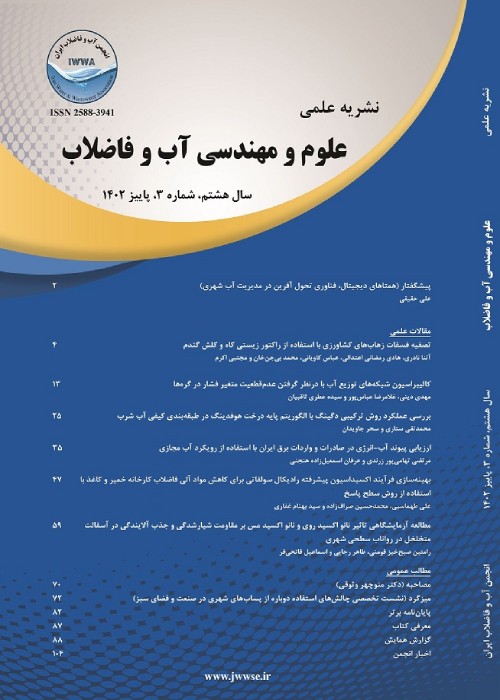Investigating the Effects of Management Scenarios Against Climate Change on River-Aquifer Interaction, Case Study: Lenjanat Sub-Basin
Nowadays with regard to the climate change issue and also the scarcity of available and usable water, the conjunctive use of surface and groundwater resources is regarded as one of the critical approaches in water resources management. In this respect, the surface water-groundwater interaction is one of the prominent and fundamental components in conducting appropriate analysis of water resources balance and finally their management. In this paper, the Lenjanat sub-basin considered as a study area that is located in the Ghavkhouni Basin in Iran. The weighting method of GCM models under the fifth report of the Intergovernmental Panel on Climate Change (IPCC) was employed to investigate the precipitation and temperature changes due to climate change and the LARS-WG model was hired to provide the microscale output of GCM models. Investigating the surface water-groundwater interaction was carried out through the connection of WEAP and MODFLOW models. Thereafter, through the usage of climate results from the climate change scenarios of RCP2.6, RCP4.5 and RCP8.5 and also implementing the management policies in the form of management scenarios in the future, along with the reduction of 20% and 40% in the area under cultivation, the system performance is assessed for the near future. The findings reveal increasing in temperature and precipitation in the future. The rate of surface water-groundwater interaction will be increased in the future under disparate management and climate change scenarios. Moreover, the maximum rate of the surface water-groundwater interaction is observed for the scenario following the current trend and also the scenario of climate change RCP4.5. Based on the outcomes, the higher the river flow and the groundwater abstraction, the more the aquifer drains the river and consequently increases the interaction of surface and groundwater. Therefore, the results indicated that the recharge effect of the river on the aquifer in the study area and on the other hand uncontrolled pumping of groundwater resources, conjunctive management of water resources can reduce the negative effects of groundwater scarcity, but it is necessary to reduce of cultivated areas and cultivation pattern prevented uncontrolled abstraction of groundwater in this sub-basin.
- حق عضویت دریافتی صرف حمایت از نشریات عضو و نگهداری، تکمیل و توسعه مگیران میشود.
- پرداخت حق اشتراک و دانلود مقالات اجازه بازنشر آن در سایر رسانههای چاپی و دیجیتال را به کاربر نمیدهد.


